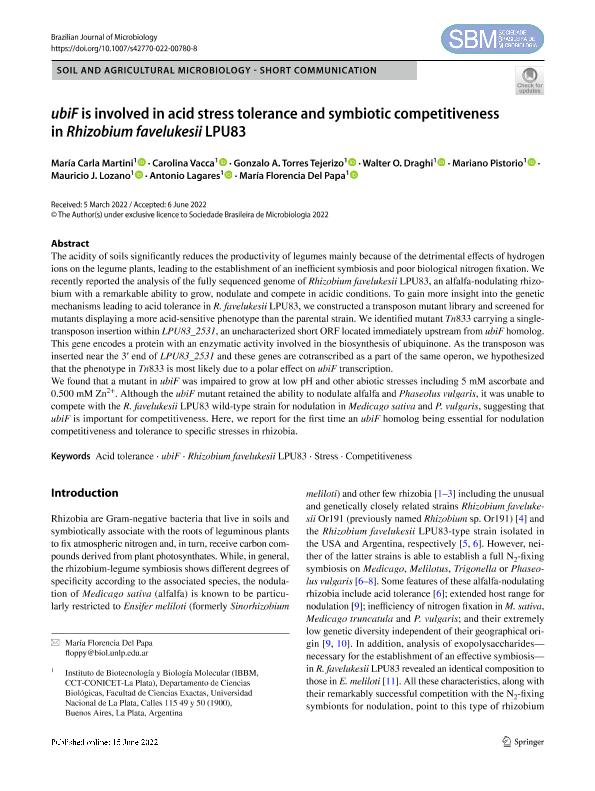Artículo
ubi F is involved in acid stress tolerance and symbiotic competitiveness in Rhizobium favelukesii LPU83
Martini, María Carla ; Vacca, Carolina
; Vacca, Carolina ; Torres Tejerizo, Gonzalo Arturo
; Torres Tejerizo, Gonzalo Arturo ; Draghi, Walter Omar
; Draghi, Walter Omar ; Pistorio, Mariano
; Pistorio, Mariano ; Lozano, Mauricio Javier
; Lozano, Mauricio Javier ; Lagares, Antonio
; Lagares, Antonio ; del Papa, Maria Florencia
; del Papa, Maria Florencia
 ; Vacca, Carolina
; Vacca, Carolina ; Torres Tejerizo, Gonzalo Arturo
; Torres Tejerizo, Gonzalo Arturo ; Draghi, Walter Omar
; Draghi, Walter Omar ; Pistorio, Mariano
; Pistorio, Mariano ; Lozano, Mauricio Javier
; Lozano, Mauricio Javier ; Lagares, Antonio
; Lagares, Antonio ; del Papa, Maria Florencia
; del Papa, Maria Florencia
Fecha de publicación:
06/2022
Editorial:
Sociedade Brasileira de Microbiologia
Revista:
Brazilian Journal of Microbiology
ISSN:
1517-8382
e-ISSN:
1678-4405
Idioma:
Inglés
Tipo de recurso:
Artículo publicado
Clasificación temática:
Resumen
The acidity of soils significantly reduces the productivity of legumes mainly because of the detrimental effects of hydrogen ions on the legume plants, leading to the establishment of an inefficient symbiosis and poor biological nitrogen fixation. We recently reported the analysis of the fully sequenced genome of Rhizobium favelukesii LPU83, an alfalfa-nodulating rhizobium with a remarkable ability to grow, nodulate and compete in acidic conditions. To gain more insight into the genetic mechanisms leading to acid tolerance in R. favelukesii LPU83, we constructed a transposon mutant library and screened for mutants displaying a more acid-sensitive phenotype than the parental strain. We identified mutant Tn833 carrying a single-transposon insertion within LPU83_2531, an uncharacterized short ORF located immediately upstream from ubiF homolog. This gene encodes a protein with an enzymatic activity involved in the biosynthesis of ubiquinone. As the transposon was inserted near the 3′ end of LPU83_2531 and these genes are cotranscribed as a part of the same operon, we hypothesized that the phenotype in Tn833 is most likely due to a polar effect on ubiF transcription. We found that a mutant in ubiF was impaired to grow at low pH and other abiotic stresses including 5 mM ascorbate and 0.500 mM Zn2+. Although the ubiF mutant retained the ability to nodulate alfalfa and Phaseolus vulgaris, it was unable to compete with the R. favelukesii LPU83 wild-type strain for nodulation in Medicago sativa and P. vulgaris, suggesting that ubiF is important for competitiveness. Here, we report for the first time an ubiF homolog being essential for nodulation competitiveness and tolerance to specific stresses in rhizobia.
Palabras clave:
ACID TOLERANCE
,
COMPETITIVENESS
,
RHIZOBIUM FAVELUKESII LPU83
,
STRESS
,
UBIF
Archivos asociados
Licencia
Identificadores
Colecciones
Articulos(IBBM)
Articulos de INST.DE BIOTECNOLOGIA Y BIOLOGIA MOLECULAR
Articulos de INST.DE BIOTECNOLOGIA Y BIOLOGIA MOLECULAR
Citación
Martini, María Carla; Vacca, Carolina; Torres Tejerizo, Gonzalo Arturo; Draghi, Walter Omar; Pistorio, Mariano; et al.; ubi F is involved in acid stress tolerance and symbiotic competitiveness in Rhizobium favelukesii LPU83; Sociedade Brasileira de Microbiologia; Brazilian Journal of Microbiology; 53; 6-2022; 1633–1643
Compartir
Altmétricas



